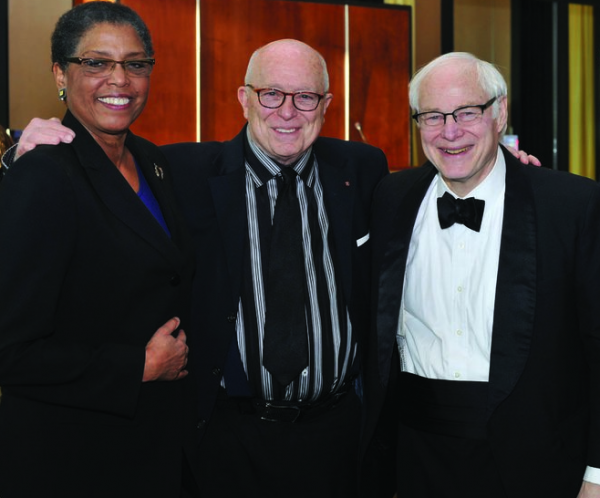Statement on the Passing of Former NEH Chairman Joseph Duffey
The Endowment’s third chairman led NEH through an era of growth

Former NEH Chairman Joseph Duffey (center), with former NEH Acting Chair Carole Watson, and former NEH Chairman Jim Leach at the 2013 NEH Jefferson Lecture in the Humanities, which was delivered by Martin Scorsese.
National Endowment for the Humanities (NEH)

Former NEH Chairman Joseph Duffey (center), with former NEH Acting Chair Carole Watson, and former NEH Chairman Jim Leach at the 2013 NEH Jefferson Lecture in the Humanities, which was delivered by Martin Scorsese.
National Endowment for the Humanities (NEH)
WASHINGTON, D.C.—The National Endowment for the Humanities (NEH) mourns the passing of Joseph Duffey, who died on Thursday, February 25, in Washington, D.C. From October 1977 through December 1981, Duffey served as chairman of NEH. Appointed by President Jimmy Carter, he led the agency through four extraordinary years, and decades afterward could be spotted in the crowd at the Jefferson Lecture in the Humanities and other NEH public events.
Before becoming chairman, Duffey served as the Assistant Secretary of State for Educational and Cultural Affairs. He had been a chief administrative officer and spokesman for the American Association of University Professors and a professor at Yale Divinity School and Hartford Seminary. In 1970, he had run, in Connecticut, as an antiwar candidate for the U.S. Senate.
It was a heady time for NEH and the humanities. In asking Duffey to lead NEH, President Carter said that he had been spending more time on this appointment than on the latest SALT strategic arms treaty.
NEH was a mere dozen years old, its budget having grown from $2.5 million to $121 million. The “Treasures of Tutankhamun” exhibition was a popular sensation drawing massive crowds to six major cities across the country with NEH support. State humanities councils were sprouting up around the country, encouraged by Senator Claiborne Pell and others who wanted federally-supported humanities programs to benefit not just scholars but all Americans.
Duffey believed firmly that the humanities could and should benefit Americans from all walks of life. He sought to increase the number of grants awarded to people of color and emphasized social history as a discipline that merited special support. He also became an object of criticism in debates over whether NEH was striking the right balance between elitism and populism.
NEH’s critics, Duffey said, “seem to regard the humanities as the province of professionals somehow above ordinary life. A refuge or a diversion from the cares of the world, or a badge of honor for those who have achieved success in their study. I understand this view but I disagree with it in the most fundamental way.”
Grants awarded during Duffey’s tenure are emblematic of how federal support can promote both scholarship and popular participation in the humanities. Two of the most enduring efforts that Duffey championed were History Day, then a burgeoning regional project still run by its founder, David Van Tassel, a history professor at Case Western Reserve University, and the Library of America, a hotly contested venture to publish affordable, scholar-vetted editions of classic American writing. Today, National History Day has inspired several million students to conduct history research and presentations, while the Library of America has published over 300 volumes of great American writing.
In a statement, NEH Acting Chairman Adam Wolfson said, “Chairman Duffey was a great friend of the humanities. He believed not only in the power of ideas but in the power of all Americans to take part in a broad culture made rich and stimulating through humanistic influence.”